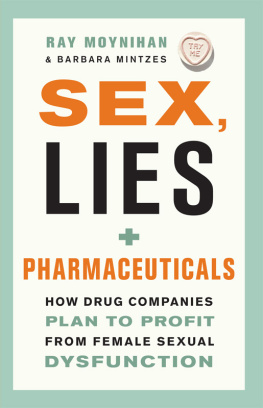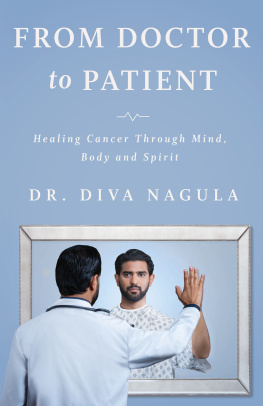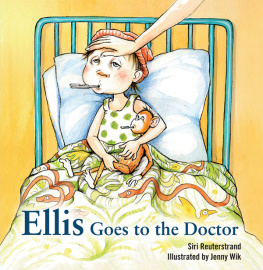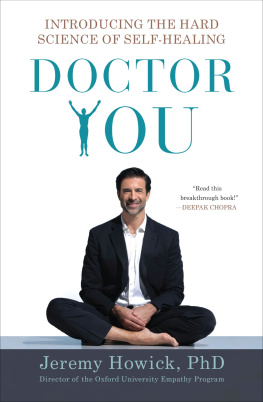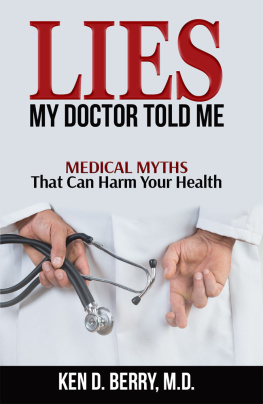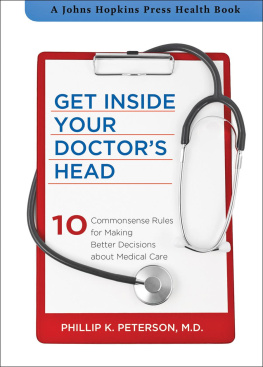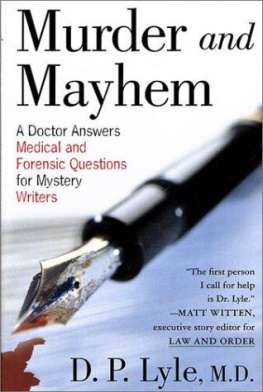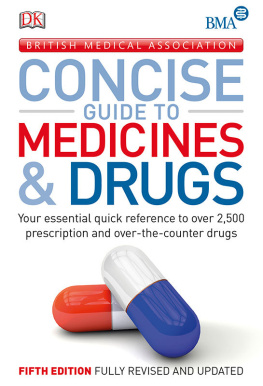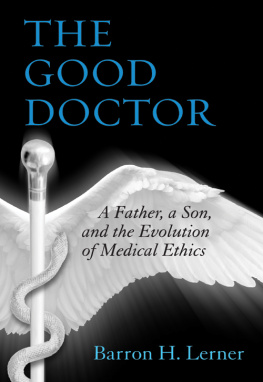Every home should have a copy of this book which provides practical tips about how to receive the best health care. Ten Questions You Must Ask Your Doctor is a well-researched book that explores how and why modern medicine is letting us down. Health professionals, particularly those in training, should study the examples in this book so they can begin to prepare their answers.
Professor Rachelle Buchbinder
Monash University, Melbourne
Doctors usually put the interests of their patients first, but they nevertheless sometimes do them more harm than good. This may be because they havent kept up-to-date with trustworthy research evidence, and sometimes because their practice has been unduly influenced by commercial considerations. Melissa Sweets and Ray Moynihans book will help patients to be aware of these problems and to work with their physicians to reduce them.
Sir Iain Chalmers
James Lind Library, Oxford
Other books by Ray Moynihan and Melissa Sweet
Ray Moynihan, Too Much Medicine?
Ray Moynihan and Alan Cassels, Selling Sickness: How drug
companies are turning us all into patients
Melissa Sweet, The Big Fat Conspiracy: How to protect
your familys health
Melissa Sweet with Les Irwig, Judy Irwig, and Lyndal
Trevena, Smart Health Choices, editions 1 and 2
Melissa Sweet, Inside Madness
Ten Questions
You Must Ask Your Doctor
How to make better decisions about drugs,
tests and treatments
Ray Moynihan and Melissa Sweet

First published in 2008
Copyright Ray Moynihan and Melissa Sweet 2008
All rights reserved. No part of this book may be reproduced or transmitted in any form or by any means, electronic or mechanical, including photocopying, recording or by any information storage and retrieval system, without prior permission in writing from the publisher. The Australian Copyright Act 1968 (the Act) allows a maximum of one chapter or 10 per cent of this book, whichever is the greater, to be photocopied by any educational institution for its educational purposes provided that the educational institution (or body that administers it) has given a remuneration notice to Copyright Agency Limited (CAL) under the Act.
Allen & Unwin
83 Alexander Street
Crows Nest NSW 2065
Australia
Phone: (61 2) 8425 0100
Fax: (61 2) 9906 2218
Email: info@allenandunwin.com
Web: www.allenandunwin.com
National Library of Australia
Cataloguing-in-Publication entry:
Moynihan, Ray.
Ten questions you must ask your doctor : how to make better decisions about drugs, tests and treatments / Ray Moynihan ; Melissa Sweet.
9781741751451 (pbk.)
Includes index.
Bibliography.
Physician and patient.
Medical care--Evaulation.
Patient education.
Questioning.
Sweet, Melissa.
615.5071
Set in 12/15 pt Spectrum by Bookhouse, Sydney
Printed in Australia by Ligare Book Printer
10 9 8 7 6 5 4 3 2 1
Contents
Foreword
Good health is something we all prize more than most things in life. It is sometimes hard to put a value on it, but we certainly know what it means when we do not have it. Keeping well has to be a partnership between us and our health providerseach has a responsibility in that relationshipand that relationship has to be built on trust and communication.
Ray Moynihan and Melissa Sweet have a reputation for asking the hard questions about health and the health system, and have now written this book on what we should be asking health practitioners about our health and suggested treatments. Patient involvement in clinical decision making is so important. No longer do we want to be told about the condition we have (or think we have), what it might lead to and the various treatment options without a clear explanation. More and more, we want to be involved in those decisions, but we need information so we can make reasonably informed decisions.
The health care system itself is very complex and navigating through it needs careful planning. It is not easy to know where or to whom we should go for a particular health problem. Each of us should have a good general practitioner who we can trust and with whom we, and other members of the health care team, can work through our particular health problem.
It is important to understand there are often a number of different ways of tackling the same problemincluding surgery, medicines, even physical exercise. What is important is that we feel we have been able to get information we can use effectivelyand trust.
Ten Questions You Must Ask Your Doctor is the book to help us navigate complex health systems which, I think, are often designed for the health professionals and the health industry rather than patients. Ray Moynihan and Melissa Sweet, who have a reputation for getting to the truth, guide us to make informed health decisions and give us the questions we need to ask: what have I got, what investigations should I have done, what are the options about surgery or medicines, and what can I do to prevent this happening again? They raise important questions regarding how we might think about information provided, particularly from the media or that produced by the health industry. They also discuss issues of the conflict of interest that can arise from the interaction between health professionals and the health industry. Dwight Eisenhower, a Republican president of the United States, often talked about his concern with the militaryindustrial complexthe links between armaments manufacturers and nation states who might discourage peace as this would influence sales of their wares. We should now be aware of the power of the medicalindustrial complex and realise that although it is a force for good and that incredible advances in medicine have been madesometimes it may favour profit (and there is nothing wrong with profit) over the interests of patients.
Communication is a two way process. It has to be remembered that many health practitioners are still coming to terms with the informed patient and feel very uneasy about being questioned by them. This book will help that dialogue by providing a clear list of the things we should be asking of our health providerand not just when we have a health problem. It underlines the responsibility we have to understand (love) and look after our bodies. This is so important because we have to place increasing emphasis on health rather than sickness as we move through the new millennium. We cannot just fund or support what is effectively an illth system. We currently spend less than 10 per cent of our health budget on disease prevention and health promotion and 90 per cent on acute care and the hospital system. If we are going to cope with the ageing population and with chronic disease, it is becoming increasingly important that we take more responsibility for our own health, what we eat, how much we exercise and develop a relationship with our health advisors so that our interactions with the health system are kept to a minimum.
Professor Peter Brooks
Executive Dean, Health Sciences, University of Queensland
Introduction
Why you need to ask your doctor some tough questions
Our health is one of the most precious things we have. Yet our health system can put our health at risk. Too often we receive tests, treatments, pills and procedures that are useless, unnecessary and even harmful. This book will help you and your loved ones avoid such unhelpful care by bringing a more questioning approach to your dealings with doctors and other health professionals.
Next page

